Personal
Portfolio
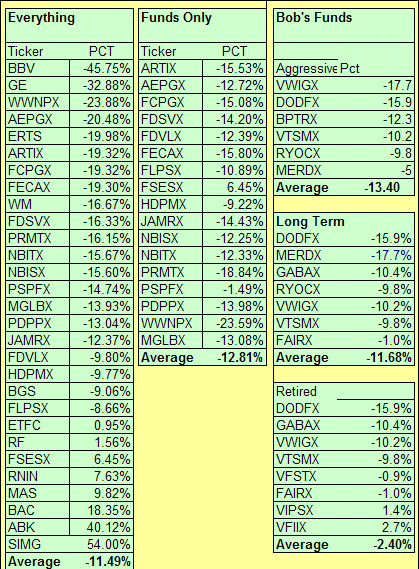
|
I
think it is safe to say Bob missed the boat this time around, proving
that timing doesn't always work. I have not major qualms with that
though. No one's perfect. I think what really threw a monkey
wrench into the markets this year was the spike in oil on top of the
sub-prime problem.
Oil goes up, markets go down - and vice versa.
I
changed my opinion on letting the commodity mutual funds run after oil
seemed to be topping out and reduced those positions to around 4% of
the portfolio. They were closing in on 10%.
Charlie Maxwell, the
famous energy analyst who works for Wheaton and Co. things oil is going
back below $100.00, where it will fluctuate for several years before
running up again. Short term, that would be my guess but who knows
given the problems in Africa and the middle East.
These times
seem to be made for the value investor. There are many dividend paying
stocks out there trading at lows not seen in recent history and I think
it is a good time to go shopping.
It's hard to say how
low some of these stocks can go but if you have a longer term horizon,
I think there are some real bargains out there.
The long term ones I like I now have: GE, MAS, BAC, ITW
Possible long term: BGS, RF, SIMG
Speculative / Trading: ABK, ETFC, RNIN
Sell on nice run-up: WM
No
comment on the mutual funds this month other than to say I have been
decreasing European exposure. The other funds are pretty much all in
the same boat.
|
What a Month.
The
dramatic seems to happen whenever I leave the country and of
late the dramatism usually errs towards pessimism. It
certainly started
looking that way this particular morning.
I had
just got done reading 'Confessions of a Sub prime Lender: An Insider's
Tale of Greed, Fraud, and Ignorance' by Richard Bitner.
The
book was written in layman's language and very easy to
understand.
The last chapter of the book discussed Alt-A mortgages, something I had
not heard of. These mortgages offered very low interest
rates,
some as low as 1%. If someone took the 1% option then the
loan
principle actually increased each month, which is called a reverse
amortization loan.
Why is this bit of information
important? Imagine you have one of these Alt-A mortgages in
Las
Vegas. You bought a home for lets say, $500,000 two years
ago.
Two years later the house is now worth $300,000 and
your 1%
Alt-A loan interest is due to reset at the going rate. Your
mortgage is going to shoot through the roof at a much higher interest
rate and your original $500,000 loan is now $550,000 because you chose
the 1% interest rate for the first two years and you thought you would
be flipping the house before the rates rose.
These loans
allowed people who couldn't get into a house any other way to get in.
Odds are they couldn't buy a home because they didn't have a
down
payment and their income was marginal at best. Multiply one
of
these loans by who knows how many homes in Nevada, California and
Florida and add in all the home flippers who used these loans to buy at
the top .... can you say 'Disaster, Part 2?' According to the
book, the first major wave of these Alt-A mortgages are due
to
reset sometime in 2009.
Ever had the feeling you were
being nudged? I got that feeling and started searching for
banks
and other lending institutions that hold these Alt-A mortgages.
I
was specifically looking for banks I currently hold.
What
appeared the following morning? An article by the WSJ in
which it
reported that Wells Fargo is holding quite a bit of this paper and they
are using various accounting maneuvers to push out and delay reporting
on Alt-A losses:
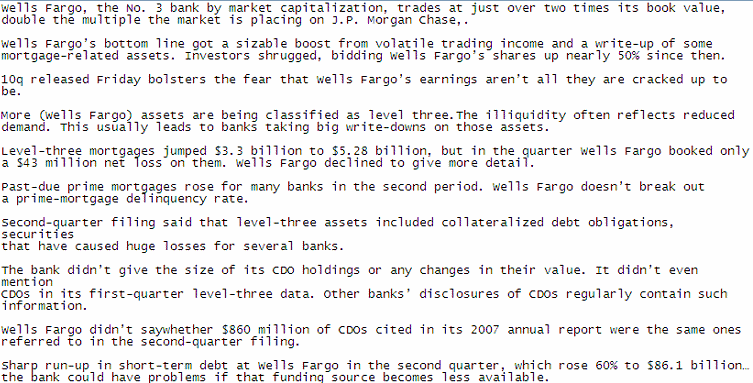
Gulp.
I sold the position.
Some sobering Bill
Gross Commentary:
U.S.
Must Buy Assets to Prevent `Tsunami,' Gross Says
By
Jody Shenn
Sept.
4 (Bloomberg) -- The U.S. government needs to start using more of its
money to support markets to stem a burgeoning ``financial tsunami,''
according to Bill Gross, manager of the world's biggest bond fund.
Banks,
securities firms and hedge funds are dumping assets, driving down
prices of bonds, real estate, stocks and commodities, Gross, co-chief
investment officer of Newport Beach, California-based Pacific
Investment Management Co., said in commentary posted on the firm's Web
site today.
``Unchecked,
it can turn a campfire into a forest fire, a mild asset bear market
into a destructive financial tsunami,'' Gross said. ``If we are to
prevent a continuing asset and debt liquidation of near historic
proportions, we will require policies that open up the balance sheet of
the U.S. Treasury.''
The
government needs to replace private investors who either don't have the
money to buy new assets or have been burned by losses, Gross said.
Pimco, sovereign wealth funds and central banks are reluctant to fund
financial firms after losses on investments they made to support the
companies, Gross said. The world's biggest banks and brokers have
raised $364.4 billion in new capital after more than $500 billion in
writedowns and credit losses since the beginning of last year.
Since
financial markets seized up a year ago as the subprime-mortgage market
collapsed, the Standard & Poor's 500 Index has fallen 13
percent
and home prices are down more than 15 percent. Yields on
investment-grade corporate bonds, debt backed by commercial mortgages
as well as credit cards reached record highs last month relative to
benchmark rates.
`Mom
and Pop'
Gross
cast a bleaker view for the prospects of the world's financial markets
than in previous notes to clients. The fund manager has previously
called on lawmakers to support housing with legislation passed in July
that allows lenders to forgive some of homeowners' debt and then
refinance them into government-insured loans.
Pimco,
a unit of Munich-based Allianz SE, is seeking to take advantage of
declines in home-loan bonds. The firm is raising as much as $5 billion
to buy mortgage-backed debt that has plunged in value, according to two
investors with knowledge of the matter. The Distressed Senior Credit
Opportunities Fund will invest in securities backed by commercial and
residential mortgages, said the people, who asked not to be identified
because the fund is private.
Paulson
Rescue
Treasury
should support not only mortgage finance providers Fannie Mae and
Freddie Mac, but also ``Mom and Pop on Main Street U.S.A.,'' by
subsidizing rates on home loans guaranteed by the Federal Housing
Administration and other government institutions, Gross said. A new
version of the Resolution Trust Corp., which bought assets from failing
institutions during the savings-and-loan crisis of the 1980s, may also
work, he said.
U.S.
Treasury Secretary Henry Paulson arranged a rescue package for
Washington-based Fannie and Freddie of McLean, Virginia as concern
escalated the government-chartered companies didn't have capital to
withstand the housing slump. Treasury pledged to pump unlimited debt or
equity into the companies should they need it.
As
Fannie and Freddie, banks, securities firms and hedge funds shrink,
yields on all debt assets will rise compared with benchmark rates and
volatility will increase, Gross said. The declines will end once
sellers have depleted their assets and sufficient capital has been
raised, Gross said. Unless ``new balance sheets'' emerge, prices of
almost all assets will drop, even those of ``impeccable'' quality, he
said.
`Anorexic' Appetite
The
extra yield demanded on Ginnie Mae's 30-year, current- coupon
mortgage-backed securities over 10-year Treasuries has climbed to 1.75
percentage points, from 0.87 percentage points at the start of last
year, according to data compiled by Bloomberg. Bonds guaranteed by the
U.S. agency are backed by the U.S. government. Spreads on 2-year AAA
rated bonds composed of federally backed student loans have climbed to
0.95 percentage points over benchmark rates, from 0.01 percentage
points below, Deutsche Bank AG data show.
``There
is an increasing reluctance on the part of the private market to risk
any more of its own capital,'' Gross said. ``Liquidity is drying up;
risk appetites are anorexic; asset prices, despite a temporarily
resurgent stock market, are mainly going down; now even oil and
commodity prices are drowning.''
Home
Prices
The
decline in home prices hasn't been seen since the Great Depression,
Gross said. That drop translates to an even bigger decline in overall
wealth as the effects ripple through markets, Gross said. Home prices
in 20 of the largest U.S. metropolitan areas fell 15.9 percent in June
from a year earlier, according to an S&P/Case-Shiller index.
Fannie
and Freddie 30-year fixed-rate mortgage bond yields, which influence
the rates on most new home loans, have probably risen 75 basis points
because of the waning demand, Gross said. A basis point is 0.01
percentage point.
The
Pimco Total Return Fund returned 9.8 percent in the past 12 months,
beating 97 percent of its peers in the government and corporate bond
fund category as of Sept. 3, according to Bloomberg data. The returns
are 5.76 percent annually over five years. Pimco has about $830 billion
of assets under management.
About
61 percent of Gross's holdings were mortgage-backed securities as of
June 30, mostly debt guaranteed by Fannie, Freddie or Ginnie Mae,
according to data on Pimco's Web site.
``In
a global financial marketplace in the process of delevering, assets
that go up in price are rare diamonds as opposed to grains of sand,''
Gross said.
There
must be some good sized banks with no sub prime exposure
and trading at fire sale prices so I started doing some
searching
and came up with this:
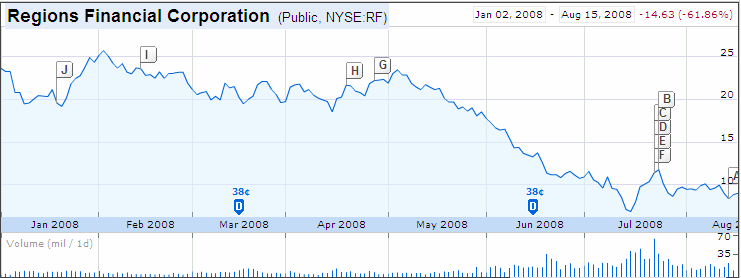
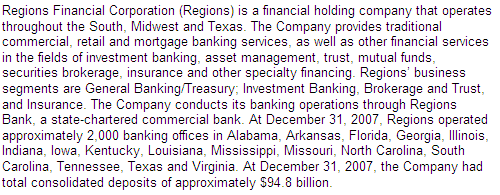
I
got it a eight and change and it looks like it has room to
run.
Fitch and Company had some comments on the stock as well.
The Report is Here:
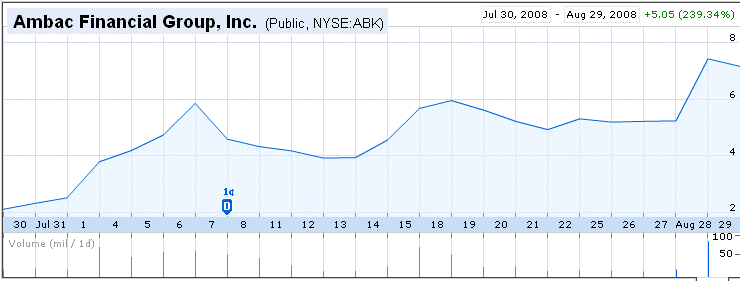
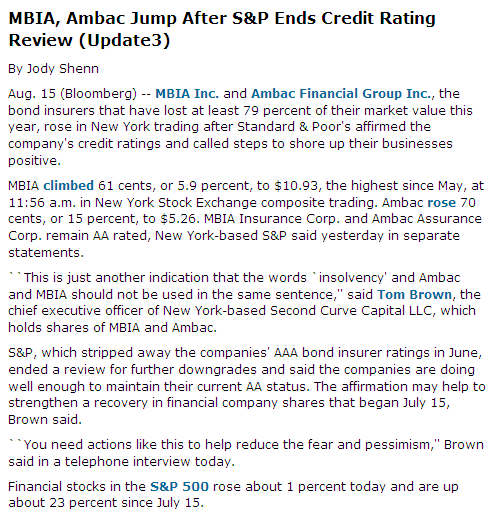
Later that morning another
article came out in which the ratings
services stated they were taking Ambak and MBIA off their watch list,
prompting a sharp run-up in the stock which prompted me to sell into
it and I managed to get back into it at another nice price.
Sold it again the other morning. I imagine there will be more chances
to buy this a bit lower.
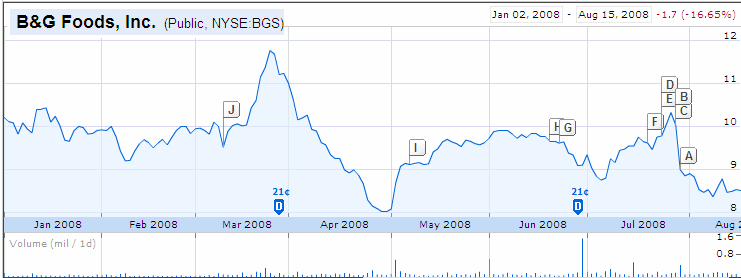
I
used the proceeds to double my position in BGS foods. They
actually do pay out that healthy dividend and the stock is trading
near
its lows. They didn't make as much the last time around
because
of an increase in syrup prices. No big surprise there.
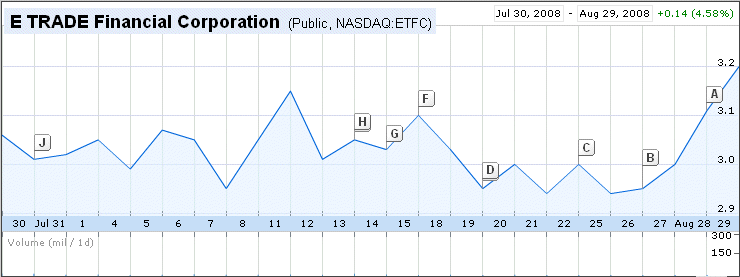
I
also doubled down on E-Trade Financial in the low 3's. They
have
been increasing their subscriber base and are issuing positive-sounding
statements. I don't know how much if any Alt-A paper they
have
and that is a big question mark.
I bought this before I finished reading the last chapter in the book.
Research is ongoing.
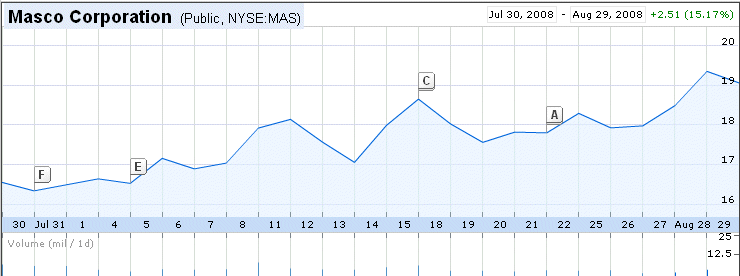
Masco
(MAS) is one of the stocks I hold in an after-tax DRIP plan and it is
down significantly off its highs. I decided to add this stock to the
retirement portfolio, with dividends set to reinvest. The stock is
yielding around 5% at this prices, which is more bang for the buck than
GE. Should have bought in the 14's, but I didn't have any
real
idea which direction the stock was headed.
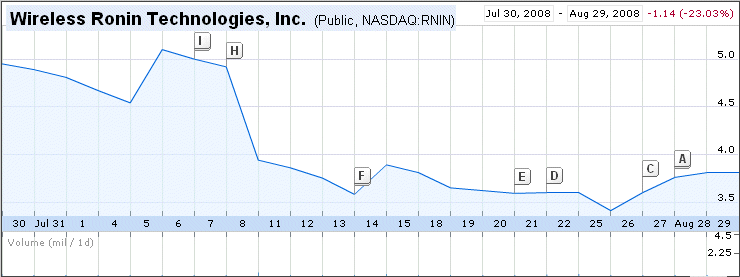
Time
to nibble on Wireless Ronin (RNIN) again? I think maybe so
and
picked up a little in the low 3's. A steady stream of PR's
usually
pushes
the stock price up and rumor control has it that more news may be the
case. One thing about RNIN's news releases - there is not a
lot
of fluff. They are pretty good about just reporting the
facts.
Here is one of the latest:
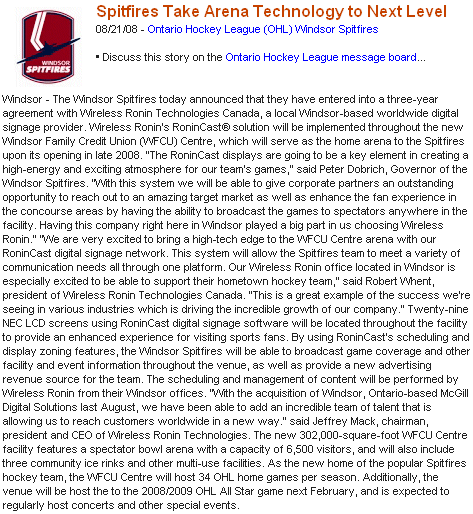
|
ITW DRIP
Registration - Part IV
OMG,
I don't believe it! The account is set up in well under six
months! I'd better quit while I am ahead. One
thing about
ComputerShare that is going to make this kind of hard is once
you
set up one DRIP through them, you can easily establish DRIP's
in
any of the other plans they are sponsoring.
Closing Thoughts
This
coming Alt-A reset has me concerned. There has been some
noise
out there about it but nothing to catch the attention of our fear
mongering media in any major way. I think it is time to
start
building reserves in a taxable account so I decided to knock the 401k
contributions back to the company match. The extra money will
go
into low risk, tax efficient instruments. There may be some
eye
popping deals on vacation properties in a couple years for people who
can swing the down payment. It wouldn't hurt to be
one of them.
We
were also socking so much money away in 401k's and 403B's that we
couldn't fund the ROTH's last year. This is another tax efficient way
to save for the future and it is not taxed when you start withdrawing
funds for retirement. 401K's and 403B's are.

~ In the land of the coming Alt-A mortgage reset,
significant cash reserves may very well be king.
|



